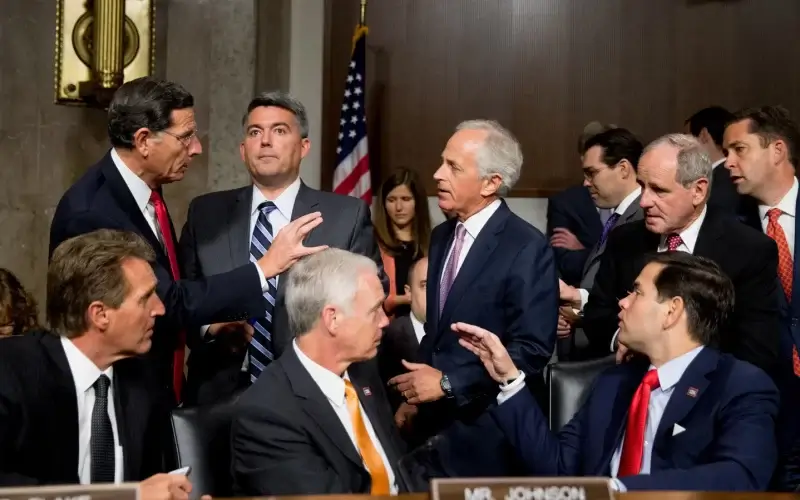Summary
1. Senate Ratification
As the Biden administration tries to revive the 2015 Iran nuclear agreement, lawmakers from both sides are concerned that the deal appeases Tehran by providing a clear path for the regime to produce a nuclear bomb. Many fear that as economic sanctions on the regime are canceled and additional funding is to the tune of $90 billion is given to the mullahs, it will free up funding for more terrorist activities. Republican lawmakers in the House and Senate have announced their intent to trigger a vote to block a treaty from being official and preventing sanctions relief for Tehran. Under the Obama administration, both Republicans and Democrats did ultimately approve the nuclear agreement, citing the numerous concerns it failed to address. The same sentiment holds today as Republican and Democratic lawmakers have vowed not to pass the nuclear agreement in the Senate, given the way Tehran has conducted itself in the region for the past several years. Without Congressional approval, lawmakers can focus on legislation that forces the Biden administration to confront Iran's terrorism and human rights abuses through economic and military sanctions. Should Republicans retake the Senate after the 2023 midterms, the agreement will not even come up in the Senate and instead urge the administration to continue the Maximum Pressure Campaign enacted under the Trump administration.
2. Reimpose Sanctions on Iran’s Economy
With the United States prepared to lift sanctions on Iran’s economy and the regime’s vital financiers of its international terrorism activities like the Central Bank of Iran (CBI), the National Iranian Oil Company (NIOC), and the National Iranian Tanker Company (NITC) are relying on this economic breathing space. In the past and present, these organizations have faced sanctions by U.S. officials for supporting the IRGC, the Quds Force, and Hezbollah in Lebanon. These entities have provided enormous sums of foreign currency to finance Iran’s terror operations by producing and transporting Iran’s oil sector to the global market. If Republicans were to take control of the federal government after the 2023 midterms, many believe that the GOP would carefully look at these three entities and reimpose sanctions for the close ties to the IRGC’s Quds Force. Almost every Republican senator, including Senate minority leader Mitch McConnell, has signed statements arguing that unless the Islamic Republic ceases its support for international terrorism, the GOP will remove and seek to reimpose any number of terrorism-related sanctions.
3. Pass Legislation to Block the IRGC Delisting
In recent weeks, Iranian officials have demanded that the Biden administration remove the Islamic Revolutionary Guards Corps (IRGC) from the U.S. State Department Foreign Terrorist Organization (FTO) list to join the deal. The Biden administration has not finalized its decision on this issue but is heavily contemplating giving into Tehran's demands to revive the nuclear agreement. If the Biden administration were to go through with its decision, there would undoubtedly be legislative backlash from both party lawmakers in the House and Senate. Almost every Republican and even several Democrats in Congress have and continue to be outspoken against such actions and have introduced various bills that would block the removal of the IRGC from the FTO. Republican lawmakers have created legislation known as the Maximum Pressure Act, which states the removal of a terror designation can only occur when Iran meets the 12 demands by then-Secretary of State Mike Pompeo under Trump’s presidency. Congressional Democrats indicated that if a vote were to come up in the House and Senate, members would vote against the administration's potential actions.
4. Block Sanction Waivers for Russia
While supporters and opponents of the 2015 Joint Comprehensive Plan of Action (JCPOA) agree that allowing Tehran to proceed with nuclear enrichment is a major flaw in the deal, Iran tried to legitimize its nuclear production by getting help from foreign countries like Russia. In the past, Russia agreed to build reactors in nuclear sites like Bushehr, expanding the regime’s ability to enrich uranium. Since Vladimir Putin's Ukraine invasion, the State Department under President Biden has provided sanctions waivers for Russia and other foreigners working with Iran’s nuclear program, pledging not to sanction Moscow’s nuclear work with Tehran. Lawmakers, however, were furious with this promise and have introduced legislation terminating this waiver entirely and preventing the President from issuing any new ones altogether. Republican and Democratic lawmakers from the Senate Appropriations subcommittees and others have indicated they are developing legislation to reverse the President and Secretary of State Antony Blinken’s waivers.
5. Block Robert Malley’s Confirmation
Ever since President Biden signed new legislation into law in December 2021, immunity for special representatives, envoys, and negotiators like Robert Malley, a member of the President’s Special Envoy for Iran, expires at the end of 2022. Should Republicans take control of the Senate next year, Malley’s confirmation would be rejected unequivocally by Senators, given his record of hostility towards the state of Israel, his views on Iran and the Houthis in Yemen, and his past comments on Hamas. Senators from both political parties have called out Malley and his actions with Iran, calling on the administration to cease any negotiations with the regime, given its past and current terrorist activities. Should Malley be forced out of his position next year by Republican Senators, President Biden would be pressured to appoint someone who is not as radical as Malley and aligns with the views of Republican lawmakers on this issue.










